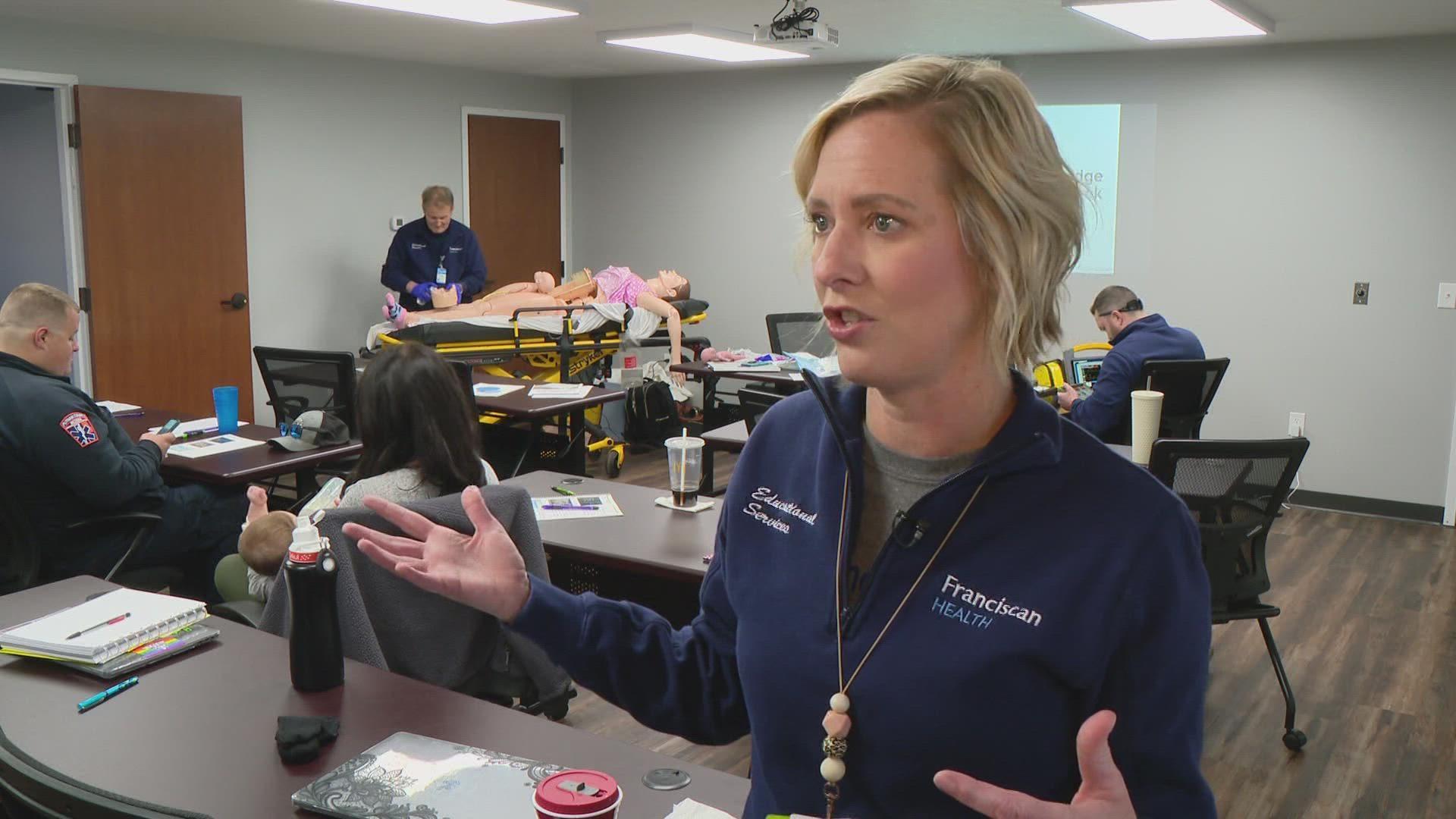PUTNAM COUNTY, Ind. — Pregnant Hoosiers living in rural Indiana counties are facing a crisis.
"A third of our counties are OB deserts, meaning they don't have a facility in the county that can care for an OB patient and so our EMS departments are having to transport patients up to an hour just to be able to get care for them," said Amanda Gill, education specialist with Franciscan Health in Indianapolis.
Gill, a labor and delivery nurse for 20 years, said the rising maternal mortality rate pushed her to co-write a course, "OB & Neonatal Emergencies for EMS," that provides education to EMS providers.
The one-day course is funded by the Hearst Foundation and allows Gill to teach EMS providers who work in maternity deserts across the state.
On Thursday, she traveled to Putnam County -- a county with limited OB resources -- to teach EMTs and paramedics there.
"They don't talk about those high-risk situations, and they don't get a lot of continuing education," said Gill. "Our state has developed perinatal levels of care, but EMS has not been educated on it and they are the ones that really need to know more than anybody else, so they know where to transport these patients."
Crews then have to transport mom and baby up to an hour away for care.
"It's not fair to the women in the state of Indiana to be able to have to go travel far distances just to safely bring their child into this world," said Kelly Russ, chief of Putnam County EMS.
Russ said crews have had to deliver a baby in the field.
"It was in one of the worst winter blizzards that I've seen in this area in a long time. Temperatures were completely dropped, and they delivered the baby at the gas pump on their way to the hospital. The mother had been sent home. She went into labor. They were trying to get to the hospital, but they had to stop for gas," said Russ.
She said the education her EMTs and paramedics receive is needed.
"We're not only dealing with mom's life, we're dealing with baby, or one, two, three babies. We never know what the gestation is. We never know if they've been getting quality prenatal care. We don't know if there's complications with the newborns unless we ask and find out. So, it's extremely important that the staff here at Putnam County EMS is prepared for everything that can possibly be thrown their way," said Russ.
Staff also received hands-on training with a simulator mom and baby.
"Here's your scenario. You got called on an OB childbirth. You showed up. She felt like her water had broken. She was having contractions, not crowning. She got on the cot, but you haven't done vital signs. OK? We ready?" said Gill as she prepped staff.
Once the baby was delivered, staff had to find out why it wasn't crying by asking the mom the right questions, like if she took any medications or if she had prenatal care.
Staff then began CPR until the baby started crying.
Putnam County Hospital lacks delivery services
Putnam County Hospital lost its labor and delivery unity back in September 2011 due to a lack of funding from the state's Medicaid program and a shortage of delivering physicians.
There is no inpatient delivery services, but there are a wide range of resources offered, including a certified nurse midwife.
"I came on and there were essentially 10 pregnant mamas waiting for me at the door," said Darla Berry, who also provides obstetric services.
Berry said a nurse practitioner provides a majority of the women's health who also runs a clinic that provides contraception. Now that that nurse practitioner is on leave, Berry is helping fill the gap.
"I've only been here a month, so we're really excited about getting the word out and letting people know that we are here," said Berry.
There are even more resources.
"I work really hard as a perinatal navigator to coordinate their care so, if they're here for OB, I'm screening to see if they qualify for WIC. If they do, we're completing that WIC appointment. We're introducing them to pediatricians. We're making all of these appointments the same day or whatever the mom prefers. That way they're not having to take off multiple days or arrange childcare multiple times," said Brianna Tyson, lactation consultant and registered nurse with Putnam County Hospital.
Tyson and Berry want to help reduce barriers.
"From that very first appointment, I'm talking to them about the benefits of breastfeeding, because we do know that that improves maternal and infant outcomes. If they don't have a breast pump, I'm helping them determine if they can order one through their insurance and if they don't, I have loaner pumps at the hospital at no cost," said Tyson.
Berry is also a member of the Indiana Maternal Mortality Review Board and said getting care early is key.
"We know 92 mothers died in 2020. We know that a lot of those deaths, over 50% of those women, didn't get prenatal care in the first trimester. If you live in a rural area and you have to drive 30 to 45 minutes to get to care, it can be very difficult to get care in the first trimester, and that care is so important because it helps us identify risk factors," said Berry.
Because saving lives is what they all want to do.
"We have to be able to offer more resources and more education," said Gill. "We need to get our legislators involved. What are we doing to help access for these maternal patients? They need access to healthcare."

